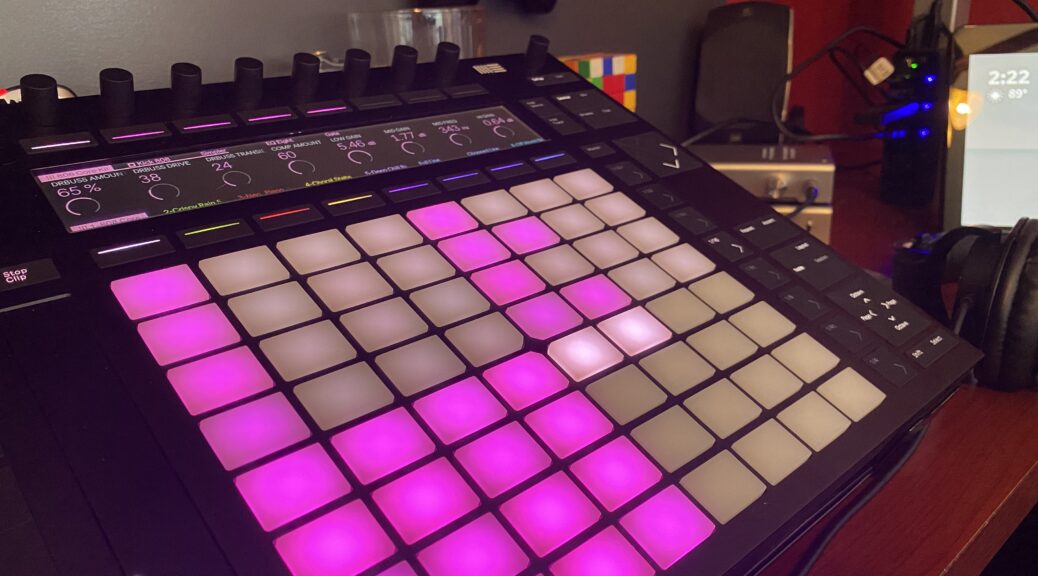
My Ableton Live/Push 2 Music Workflow at the moment…
While I’m nowhere near an expert on the matter, I do feel like I’ve figured out a workflow that suits the way my brain wants to do things.
Right now my setup is primarily Ableton Live 10 and their Push 2 midi controller. While I’m sure there’s all kinds of 3rd party plugins that do certain things much better, I’m trying as hard as I can to stay with the default Live plugins and such. I do have some free VST plugins that I occasionally delve into. The most notable of those is the free NeoPiano VST from SoundMagic. Aside from that, I did splurge on Serum which is a ridiculously powerful software synthesizer when I found a great discount code for it. Beyond that, I’m sticking with the free stuff until I find a darn good reason not to.
But you’re not here for my set up….
“I’ve never once finished a project. I’ve just decided to stop working on them.”
As far as actually creating music, my process goes pretty much like this:
- Fiddle around – I don’t start out saying “today I’m going to make vaporwave/retrowave/lofi/etc.” Instead, I open up Ableton Live and start messing around. Maybe I’ll try out a drum set that sounds interesting to me or I’ll drop in a Serum track and start playing with the settings. Eventually, I might stumble across something that makes me say “Oooo! I like that!”.
- Expand and Experiment – Ok, so in step one I found a sound that brought me joy. It’s time to brain storm. What can I do with that sound? What kind of music would suit it the best? From here I’ll start layering on sounds and such. Maybe I’ll think “I could use some kind of vocal sample here”. I’ll make an article at some point as to how I capture vocal samples. Ultimately, I’m just trying to make the song sound cool to me.
- Hit a creative brick wall – This is where I start questioning my own ability and feeling like I’m working on a song that is far beyond what I’m capable of making. I save my work and then go play Minecraft multiplayer for a bit.
- Smash through the brick wall – Throughout my break, I’ve had the song ringing in the back of my head like some kind of psychotic ear worm. Usually about 24 hours after my initial collision with the brick wall of self loathing, I load the song back up and realize that I was closer to my vision of the track than I originally gave myself credit for. With just a couple tweaks and additions, I can have a song I’ll be proud of.
- Make some tweaks and additions – I move things around, add some effects, firm up the drop, etc. I could easily spend weeks on this phase but there’s an old saying that I constantly use in my programming career “I’ve never once finished a project. I’ve just decided to stop working on them.”
In other words: you have to know when to stop. There is ALWAYS something you can tweak or improve or add. Eventually, the question is whether or not the time you spend on that has enough impact to actually be worth the effort. - Polish – I’ve decided enough is enough. I’m happy with the product and it makes me groove. This is where I start my mastering of the track. This is the part where I feel like I still have the most to learn. Some people like to freeze their tracks and export just the audio to a separate project to do the mastering. I hate doing that. I tried it, it was a pain and didn’t have any real impact on the final product other than just adding a bunch of extra steps. My computer is beefy as heck and can easily handle the load of mastering in the same project (#LowKeyFlexing).
- Freak out and publish – Now is the time to send my work to SoundCloud. I usually have a small panic attack as it uploads. Did I use something copyrighted that I didn’t realize? Are the samples I used actually public domain or at least transformative enough to fall into fair use? Will I get flamed in the comments? Will anyone listen at all? Am I wasting my time? Am I filling out their stupid metadata form correctly?!?
- Self-critique – Now is the most
horribleimportant part: going back and listening to the song I have created and seeing where it can be improved. I’ll often even take notes as to what can be done. The ability to seriously analyze your own work is a surprisingly difficult skill. It’s a delicate balance between “figuring out what I can do better next time” and “completely taking a dump on my own work and utterly destroying my self esteem”. I plan on making an article soon about how to go about critiquing your own work without sending yourself into a spiraling depression.
Every song I’ve made so far has followed this admittedly high-level overview. Ultimately, this is a work flow I apply to just about every creative endeavor I do from music to painting to programming. Hopefully this either helps you get your own process together or validates the similar process you’re using.
Stay Crispy, friends.